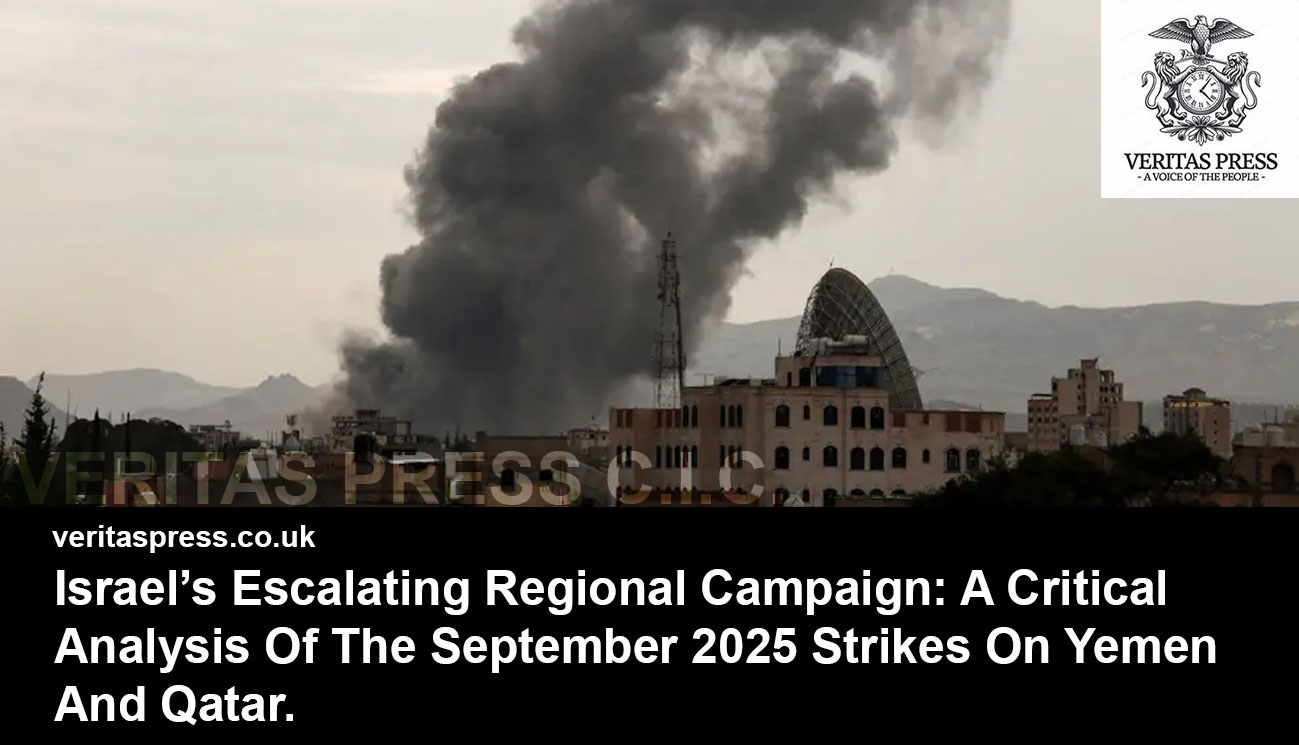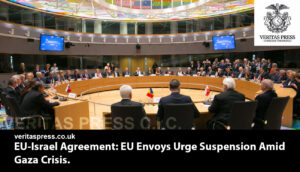Press Release: Veritas Press C.I.C.
Author: Kamran Faqir
Article Date Published: 11 Sept 2025 at 17:47 GMT
Category: Middle East | Yemen | US-Israel At War
Source(s): Veritas Press C.I.C. | Multi News Agencies
In a dramatic escalation of its regional military operations, Israel has launched a series of airstrikes targeting Yemen’s capital, Sanaa, and the northern al-Jawf governorate, resulting in at least 35 fatalities and over 130 injuries. This offensive follows a controversial Israeli airstrike in Doha, Qatar, which targeted Hamas political leaders during ceasefire negotiations, leading to widespread condemnation from regional and international actors. These developments mark a significant intensification of Israel’s military engagements across the Middle East.
The Sanaa And Al-Jawf Strikes: Civilian Casualties And Infrastructure Damage.
On September 10, 2025, Israeli Air Force jets conducted airstrikes on various targets in Sanaa and al-Jawf. According to Houthi officials, the strikes resulted in 35 deaths and 131 injuries, with civilian areas, including residential neighbourhoods, a medical facility on al-Sitteen Street, and a government compound in al-Hazm, being hit. Notably, the Houthi-run Al Masirah TV reported that the raids also targeted the Moral Guidance Headquarters, a key government facility. In response, Houthi military spokesman Yahya Saree stated that the group’s air defences launched surface-to-air missiles, forcing some Israeli aircraft to retreat before completing their missions. Israel’s military confirmed the attacks, stating they targeted Houthi military camps, a propaganda headquarters, and a fuel storage facility used by the group. Prime Minister Benjamin Netanyahu justified the strikes as retaliation for a Houthi drone attack on Ramon Airport in Israel.
ANSARALLAH MILITARY SPOKESMAN: “The brutal aggression will not go unanswered or unpunished. We deny the enemy’s claims of targeting missile launch platforms. The enemy’s raids struck civilian sites, including two newspapers, where journalists were killed.” Israel Targets Yemeni Capital, Ansarallah Says Attacks Will Not Halt Operations.
ANSARALLAH MEDIA RELATIONS: The director of media relations for Ansarallah stated that the group will retaliate for the Israeli attack on civilians in Sana’a by targeting settlers wherever they may be. Missile Launch from Yemen.
The international community has expressed concern over the escalating violence. Qatar condemned Israel’s recent airstrike in Doha that killed six Hamas negotiators, accusing Israel of “state terror” and alleging it destroyed any hope of freeing the remaining hostages in Gaza. The United States, the United Kingdom, Russia, and China criticised the strike, with UK Prime Minister Keir Starmer denouncing Israel’s violation of Qatari sovereignty. Meanwhile, Israel’s war in Gaza has led to the deaths of over 64,000 Palestinians since hostilities began in October 2023, following a Hamas attack that killed 1,200 Israelis and led to the abduction of 250 people.
The Doha Strike: Diplomatic Fallout And Regional Tensions.
The Israeli airstrike in Doha targeted Hamas political leaders during a meeting to discuss a U.S.-brokered ceasefire proposal. Qatar’s Prime Minister, Sheikh Mohammed bin Abdulrahman al-Thani, condemned the attack as “state terror,” alleging it destroyed any hope of freeing the remaining hostages in Gaza. The strike has escalated tensions and disrupted ongoing ceasefire and hostage negotiations, with Qatar and Egypt playing key mediation roles. Qatar is now organising an Arab-Islamic summit, and Sheikh Mohammed is expected to address the U.N. Security Council. The attack has heightened Israel’s global isolation and further complicated efforts to end the conflict.
In a related development, activists stormed Israel’s Channel 14 television station, demanding an end to the country’s military actions in Gaza and Yemen. The protest highlights growing domestic opposition to Israel’s foreign policy and military engagements.
Analytical Perspectives: Strategic Calculations And Regional Implications.
1. Strategic Objectives and Military Doctrine:
Israel’s recent military actions appear to be part of a broader strategy to deter regional adversaries and assert its military dominance. The strikes on Yemen and Qatar, while targeting specific groups and individuals, also risk exacerbating regional instability and drawing Israel into broader conflicts. Analysts suggest that these operations may be aimed at signalling Israel’s willingness to act decisively against perceived threats, but they also raise questions about the long-term effectiveness and ethical implications of such an approach.
2. Diplomatic Fallout and International Relations:
The airstrikes have strained Israel’s relations with key regional actors, including Qatar and the broader Arab world. Qatar’s condemnation and the subsequent diplomatic fallout underscore the challenges Israel faces in maintaining alliances and partnerships in the Middle East. The involvement of international mediators, such as the United States and the United Kingdom, further complicates the situation, highlighting the global dimensions of the conflict.
3. Humanitarian Considerations and Civilian Impact:
The civilian casualties and infrastructure damage resulting from the airstrikes have drawn criticism from humanitarian organisations and international observers. The targeting of medical facilities and residential areas raises concerns about adherence to international humanitarian law and the protection of civilian life. The humanitarian crisis in Gaza, compounded by the ongoing conflict, underscores the urgent need for a comprehensive and sustainable peace process.
Conclusion: Israel’s Regional Escalation And The Erosion Of Diplomatic Norms.
Israel’s recent military actions in Yemen and Qatar signify a deliberate and troubling escalation of its regional campaign, characterised by a pattern of aggression that undermines international norms, destabilises sovereign nations, and exacerbates humanitarian crises.
1. Yemen: Civilian Casualties and Cultural Destruction.
On September 10, 2025, Israeli airstrikes targeted civilian and cultural sites in Yemen, resulting in at least 35 deaths and over 130 injuries, according to Houthi officials. The attacks hit residential areas in Sanaa’s al-Tahrir neighbourhood, a medical facility on 60th Street, and a government compound in al-Jawf’s capital, al-Hazm. Notably, the National Museum of Yemen sustained significant damage, highlighting a disregard for cultural heritage. Houthi military spokesman Yahya Saree claimed that the group’s air defences launched surface-to-air missiles, forcing some Israeli aircraft to retreat before completing their missions. Israel confirmed the strikes, stating they targeted Houthi military camps, a propaganda headquarters, and a fuel storage facility.
2. Qatar: Sovereignty Violations and Diplomatic Fallout.
The Israeli airstrike in Doha targeted Hamas political leaders during a meeting to discuss a U.S.-brokered ceasefire proposal. Qatar’s Prime Minister, Sheikh Mohammed bin Abdulrahman al-Thani, condemned the attack as “state terror,” alleging it destroyed any hope of freeing the remaining hostages in Gaza. The strike has escalated tensions and disrupted ongoing ceasefire and hostage negotiations, with Qatar and Egypt playing key mediation roles. Qatar is now organising an Arab-Islamic summit, and Sheikh Mohammed is expected to address the U.N. Security Council. The attack has heightened Israel’s global isolation and further complicated efforts to end the conflict.
3. Broader Regional Implications:
Israel’s recent military actions are part of a broader strategy to deter regional adversaries and assert its military dominance. The strikes on Yemen and Qatar, while targeting specific groups and individuals, also risk exacerbating regional instability and drawing Israel into broader conflicts. Analysts suggest that these operations may be aimed at signalling Israel’s willingness to act decisively against perceived threats, but they also raise questions about the long-term effectiveness and ethical implications of such an approach.
4. Humanitarian Considerations and Civilian Impact:
The civilian casualties and infrastructure damage resulting from the airstrikes have drawn criticism from humanitarian organisations and international observers. The targeting of medical facilities and residential areas raises concerns about adherence to international humanitarian law and the protection of civilian life. The humanitarian crisis in Gaza, compounded by the ongoing conflict, underscores the urgent need for a comprehensive and sustainable peace process.
5. Calls for Accountability and International Response:
The international community has expressed concern over Israel’s actions. Qatar condemned Israel’s recent airstrike in Doha that killed six Hamas negotiators, accusing Israel of “state terror” and alleging it destroyed any hope of freeing the remaining hostages in Gaza. The United States, the United Kingdom, Russia, and China criticised the strike, with UK Prime Minister Keir Starmer denouncing Israel’s violation of Qatari sovereignty. Meanwhile, Israel’s war in Gaza has led to the deaths of over 100,000 Palestinians since hostilities began in October 2023, following a Hamas attack that killed 1,200 Israelis and led to the abduction of 250 people.
Conclusion:
Israel’s recent military actions in Yemen and Qatar represent a significant escalation in its regional operations, with far-reaching implications for diplomatic relations, regional stability, and humanitarian conditions. The international community’s response, including condemnation and calls for restraint, reflects the complex and interconnected nature of the Middle Eastern geopolitical landscape. As the situation continues to evolve, all parties must prioritise dialogue, adhere to international law, and work towards a peaceful resolution to the ongoing conflicts.
Tags:




























Leave a Reply